Somali Cats: The Long-Haired Abyssinians and Their Care

Somali Cats: Long-Haired Abyssinians Care Guide
Learn how to care for Somali Cats with their grooming needs and exercise requirements.
Breed Overview
Originating as long-haired versions of Abyssinians in Great Britain during the late 1960s, Somali cats have distinct characteristics that set them apart within the feline world. These cats inherit their long-haired gene from their Abyssinian relatives but stand out with their luxurious coat that comes in colors like red, ruddy, blue, fawn, and sorrel, showcasing a unique ticked pattern.
Somali cats aren't just visually striking; they also require interactive play to stimulate their intelligent and playful nature. This breed thrives on human interaction and enjoys high-energy activities, making their exercise needs an essential aspect of their care routine.
When it comes to hereditary health, Somali cats are generally robust, but like all breeds, they may have predispositions to certain conditions. Providing a loving home with ample opportunities for interactive play and regular grooming will ensure that these sociable and affectionate cats lead a fulfilling and healthy life.
Somali Cat Characteristics
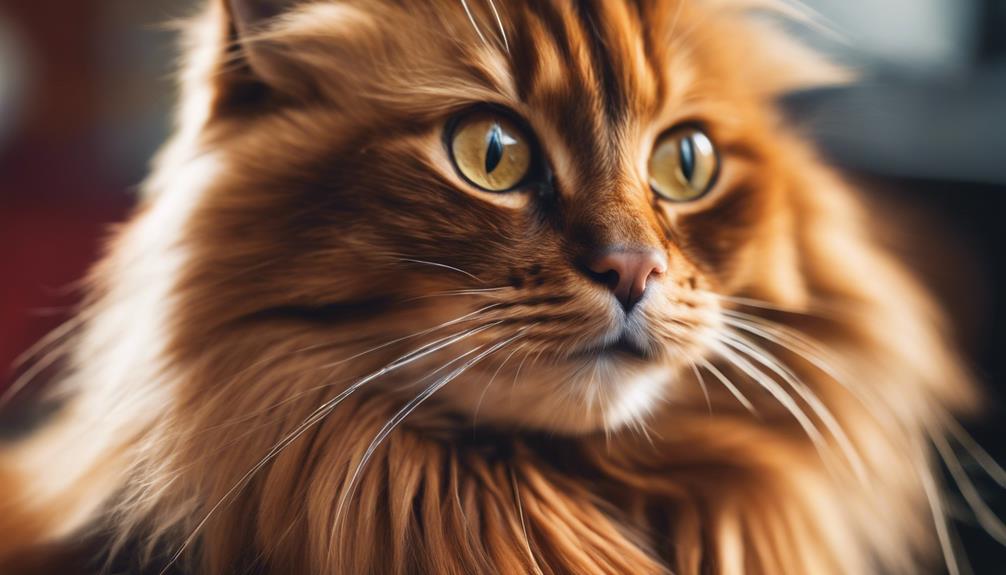
Somali cats, with their medium to large size, striking facial markings, and unique long and bushy tapering tails, exhibit distinctive characteristics that set them apart within the feline world. These long-haired Abyssinians are known for their lithe, muscular bodies that give them a regal appearance reminiscent of a small mountain lion or cougar.
One of the most striking features of Somali cats is their facial markings, which add to their allure and charm. Their bushy tails, which taper to a point, are a standout feature, earning them the endearing nickname 'fox cat.' In addition to their physical attributes, Somali cats come in a variety of coat colors, including sorrel, lilac, cream, and silver, adding to their visual appeal.
To maintain their active nature, Somali cats require plenty of exercise through play and even leashed walks. A high-protein diet is essential for keeping these energetic cat breeds healthy and thriving.
Grooming Needs
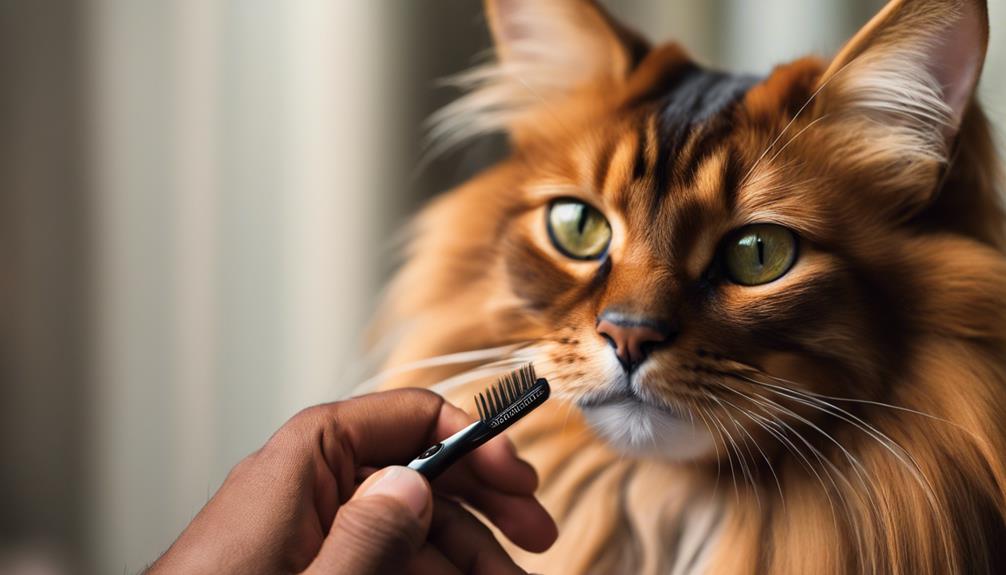
Regular grooming is essential for maintaining the health and appearance of Somali cats' soft, silky coats. Here are some key points to consider when caring for the long-haired beauties:
- Brushing: Somali cats need regular brushing to prevent matting and tangles in their luxurious coats. This grooming routine not only keeps their fur looking shiny but also helps in distributing natural oils for healthy skin.
- Dental Health: Proper dental care is crucial for Somali cats. Regular tooth brushing is recommended to prevent dental issues like periodontal disease. Additionally, occasional veterinary dental cleanings may be necessary to ensure overall oral health.
- Enjoyable Grooming: Many Somali cats enjoy grooming sessions. It can be a bonding experience between the cat and its owner while also keeping the cat's coat in top condition.
- Coat Care: Maintaining a regular grooming schedule is vital for Somali cats to keep their coats healthy, shiny, and free from mats and tangles. Regular care ensures that their long fur remains beautiful and manageable.
Exercise Requirements
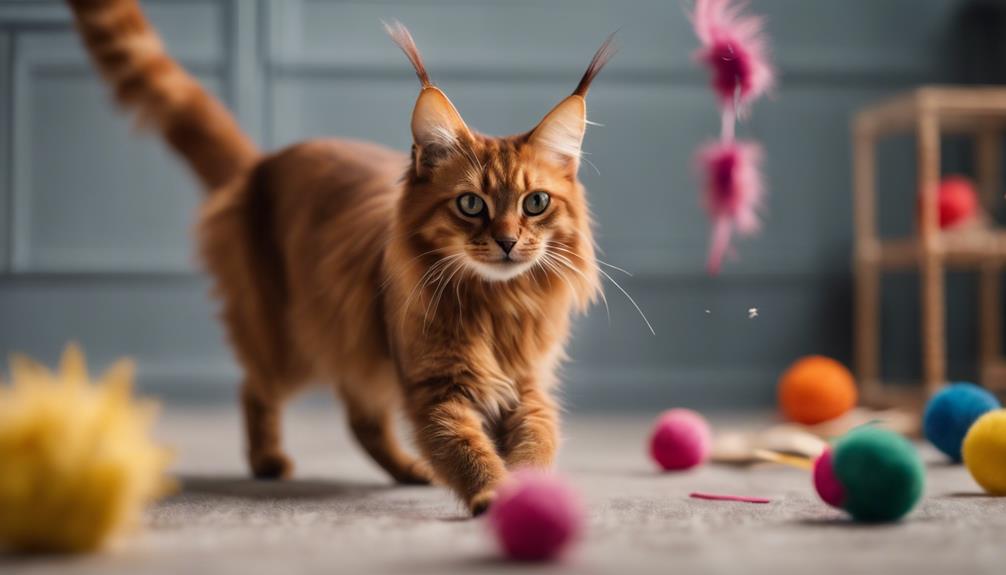
Somali cats have high exercise needs, necessitating regular physical activity to keep them engaged and healthy.
Interactive play sessions are crucial for their mental and physical enrichment, requiring multiple daily sessions.
Providing climbing structures and high perches allows Somalis to satisfy their natural urge to jump and explore their surroundings.
Physical Activity Needs
Highly active and energetic, these long-haired Abyssinians require daily exercise to ensure their health and happiness. To meet their exercise needs effectively, consider the following:
- Interactive Toys: Provide toys that engage their natural instincts to climb, jump, and play.
- Tall Structures: Install cat trees or shelves to encourage climbing and provide elevated spaces for exploration.
- Leashed Walks: Take them on supervised outdoor walks to stimulate their senses and allow for safe exploration.
- Play Sessions: Engage in regular play sessions throughout the day to keep them physically active and mentally stimulated.
Ensuring these exercise requirements are met not only promotes their physical health but also helps prevent behavioral issues, contributing to their overall well-being.
Playtime for Enrichment
To ensure the optimal physical and mental well-being of long-haired Abyssinian cats, engaging in stimulating playtime activities is essential. Somali cats are highly active and enjoy interactive play sessions with toys, climbing structures, and engaging activities. Regular playtime not only prevents boredom and behavioral issues but also promotes a healthy lifestyle for Somali cats. Their exercise requirements include daily play sessions to satisfy their energetic and curious nature. Providing a variety of toys and play opportunities helps meet the exercise needs of Somali cats and strengthens the bond between pet and owner.
| Activity | Description | Benefits |
|---|---|---|
| Interactive Play | Engage in play sessions with toys | Mental stimulation, bonding |
| Climbing Structures | Provide structures for climbing and jumping | Physical exercise, agility |
| Puzzle Toys | Offer toys that dispense treats when solved | Mental engagement, problem-solving |
Common Health Issues
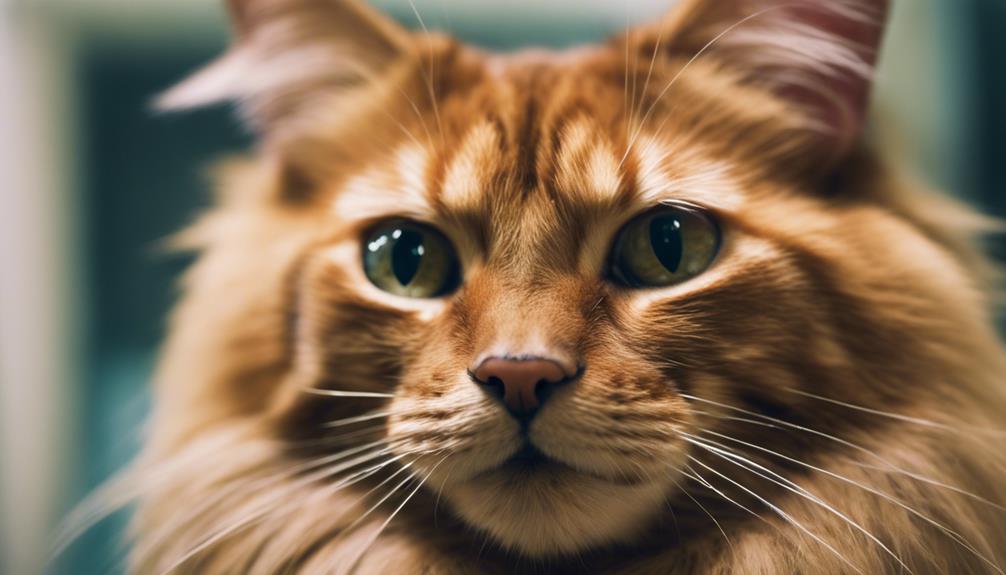
When caring for Somali cats, vigilance for common health issues is vital to ensure their well-being and longevity. Here are some key points to consider:
- Genetic Health Concerns: Somali cats, being longhaired, are prone to genetic conditions such as pyruvate kinase deficiency (PKDef) and progressive retinal atrophy. Regular vet check-ups are crucial for early detection and management of these issues.
- Dental Care: Regular dental care is essential for Somali cats to prevent periodontal disease, which can lead to various health problems if left untreated. Brushing their teeth regularly and providing dental treats can help maintain good oral hygiene.
- Obesity Awareness: Watch for signs of obesity in Somali cats and adjust their diet and exercise routine accordingly. Obesity can contribute to various health issues and reduce their quality of life.
- Indoor Lifestyle: Keeping Somali cats indoors can protect them from environmental hazards and reduce the risk of health issues such as accidents, exposure to pathogens, and predatory attacks. It also helps in controlling their diet and activity levels effectively. Regular playtime indoors can provide mental and physical stimulation to keep them healthy and happy.
Dietary Considerations

To support the overall health and energy levels of Somali cats, a high-quality diet rich in protein is essential for their well-being. Somali cats, known for their active nature, require a diet that meets their nutritional needs to maintain their muscular physique. It's crucial to avoid feeding them fillers or grains with little nutritional value, as this may lead to deficiencies and health issues. Consulting with a veterinarian is recommended to determine the most suitable foods for Somali cats. A balanced diet is key to ensuring that these cats receive the necessary nutrients for optimal health.
Due to their breed characteristics, Somali cats may have specific dietary requirements that differ from other breeds. Providing them with a high-quality diet not only supports their energy levels but also contributes to their overall well-being. By focusing on the nutritional value of the food they consume, owners can help their Somali cats thrive and lead healthy lives. Remember, a well-balanced diet plays a vital role in keeping these beautiful felines in top shape.
Adoption and Purchase Options
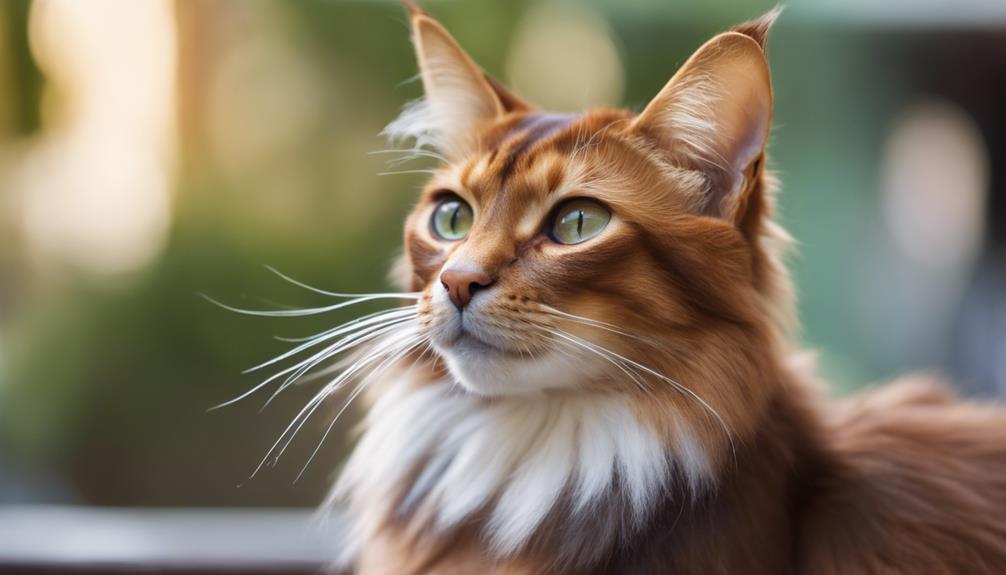
Consider exploring various avenues when seeking to adopt a Somali cat, such as shelters, rescue organizations, or breed-specific rescues. Here are some key points to keep in mind:
- Affordability: Adoption fees for Somali cats can range from $50 to $200, providing a budget-friendly option compared to purchasing from breeders, which may cost $500 to $1500.
- Documentation and Guarantees: Breeders typically offer proper documentation and health guarantees when you purchase a Somali kitten, ensuring transparency and peace of mind.
- Consideration of Factors: Before adoption or purchase, evaluate the cat's age, health history, and compatibility with your lifestyle to ensure a harmonious fit within your home.
- Exploration of Options: Research local adoption events, online platforms, and breed clubs dedicated to Somali cats to find a feline companion in need of a loving home. These avenues not only offer a chance to provide a home to a cat in need but also enrich your life with the presence of a Somali feline friend.
Frequently Asked Questions
What Are the Pros and Cons of Somali Cats?
When considering Somali cats, it's essential to note their grooming requirements, energy levels, temperament differences, health concerns, shedding patterns, exercise needs, socialization tips, and coat colors. These factors contribute to the overall care and well-being of these beautiful felines.
Are Somali Cats High Maintenance?
Somali cats are indeed high maintenance due to their long coats that need regular grooming, high energy levels requiring interactive play, and potential health concerns like dental care. Providing engaging activities and veterinary check-ups are crucial.
How Do You Take Care of a Somali Cat?
To take care of a Somali cat, grooming tips include weekly brushing, regular claw trimming, and teeth brushing. Engage in playtime, feed high-protein food, and schedule vet check-ups. Bond through interactive activities, provide environmental enrichment, and monitor shedding control.
Are Abyssinian Cats Easy to Take Care Of?
Abyssinian cats are generally easy to take care of due to their minimal grooming needs. Regular vet check-ups, a balanced diet, and engaging playtime activities are essential for maintaining their health and well-being.











